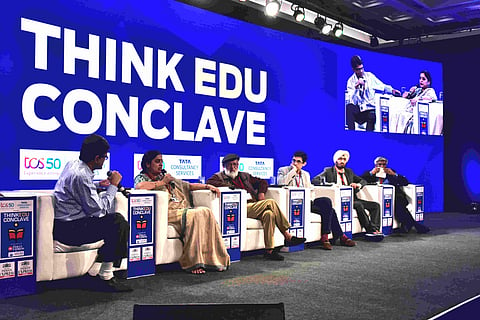

The right technology in the right hands does not pose a threat to India’s young becoming un-creative, was almost the unanimous conclusion of the expert panel at the end of the session on ‘Is too much tech making young India un-creative?’ on the second day of the ThinkEdu Conclave on Thursday. “The usual idea is that technology will impede brainstorming. But, on the contrary, it will help brainstorming,” said Taran Singh, founder of Melvano, an app to help students and teachers of IIT connect. “In fact, there are studies to show that video games like PUBG help in improving the visual-spatial ability of users and problem solving capabilities,” he added.
Speaking on her experiences of organising a literary festival in Kolkata and how tech helped bridge the gap, Director of Kolkata Literary Meet, Malavika Banerjee said, “We conduct the literary fest in Kolkata’s magnificent Victoria Hall where we faced certain issues like parking. We, then started live streaming and the response increased manifold. People from Norway were listening to Bengali poetry.” To emphasise her point on ‘Nothing can stop a creative mind from creating,’ Malavika recalled an exhibition that was held in Kolkata a year and a half ago where weaving from different parts of the world were showcased.“There was a store from Guatemala at the exhibition that had their traditional designs on display. Around seven to eight months later, weavers in South Bengal were able to recreate the design on a sari,” she said. “This would have been impossible if not for the technology,” she added.
The resistance that technology meets then and there has been historical in many ways, said Pushpesh Pant, former professor of JNU. “When I was in school half a century ago, they told me not to use a ball-point pen because it would ruin my handwriting. Our parents had the same problem with fountain pens,” he said. Nevertheless, technology has stayed and thrived, with human beings being homo technicus.
The Andhra Pradesh Government has put technology to good use, harnessing the interest of the non- resident Indian community in the development of their home towns, said Jayaram Komati, special representative for North America, Andhra Pradesh Government. Funds from the community has gone towards improving schools in the State, he said. “We have created around 3600 digital classrooms where kids will have access to technological tools right from the beginning,” he said.
Speaking on its pitfalls, Mayank Kumar, the Co-founder of UpGrad, an online higher education platform said that plagiarism was an important one and that they were working on several ways to combat it - and to bridge the issue of declining human interaction because of technology.
